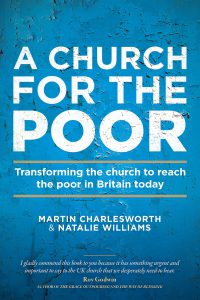Q&A: Who are the poor? Is our first challenge the spiritually poor?
Anonymous asks:
We are challenged certainly in some Anglican communities to look after the poor. I suppose the biggest question is going to be who are the poor? May seem a daft question, but in financial terms we have very few poor. However, certainly some of the financially richest people I know are very, very poor; spiritually and otherwise? My personal thought is that we do have poor with us, right now. Our challenge is to reveal those clothes they are wearing are actually rags. Is that our first big challenge?

[This is a Q&A question that has been submitted through this blog. You can submit a question (anonymously if you like) here: http://briggs.id.au/jour/qanda/]
Thanks for the question. I have some general thoughts on this in a recent review: A Church for the Poor?
My first thoughts on the poor usually arrive with the famous “sheep and goats” passage of Matthew 25. In this passage the returning King, acting as judge, declares (for the righteous):
“Come, you who are blessed by my Father; take your inheritance, the kingdom prepared for you since the creation of the world. For I was hungry and you gave me something to eat, I was thirsty and you gave me something to drink, I was a stranger and you invited me in, I needed clothes and you clothed me, I was ill and you looked after me, I was in prison and you came to visit me.”
‘Then the righteous will answer him, “Lord, when did we see you hungry and feed you, or thirsty and give you something to drink? When did we see you a stranger and invite you in, or needing clothes and clothe you? When did we see you ill or in prison and go to visit you?”
‘The King will reply, “Truly I tell you, whatever you did for one of the least of these brothers and sisters of mine, you did for me.”
And of course, there’s an equivalent and negative judgement for those who did not feed, give drink, clothe, or visit etc.
This gets us into your question. Who are the poor? They are indeed those who are financially, physically impoverished: hungry, destitute, excluded by their circumstances.
We can’t overlook this. There is a clear gospel challenge to look after and to care for the physically poor. This is clear from the Scriptures: the laws on gleaning is about providing for those who are literally hungry, as are the many passages that talk about caring for widows and orphans, who lack the stability and security not only of societal standing, but also of the basics of life. James considers the care of these physically vulnerable people to be an aspect of “genuine religion”.
It also gives some exhortational force. Who are the poor? The ones who we can see. We are held to account for who is in front of us; e have personal responsiblity for those who God brings across our path. There is also communal responsiblity for those who are in front of us as a community. This is just as serious and calls us to move our community towards caring for the poor through advocacy and social justice and personal example.
We cannot ignore the physically poor. As Keith Green would imply, we make too many excuses, individually and together, we ought to care for those who do not have as much we are do. It is good in its own right. It is a gospel imperative. Or shall we insist that what we have is ours alone, and not God’s?
But you are right, there is also a spiritual poverty. But there are two ways in which we need to take this.
Firstly, there is spiritual poverty that speaks to a hardness of heart, a self-righteousness that, as you say, dresses itself in resplendent rags. This is not just preening and pride, but facade, self-reliance, the idolisation of financial security, and other “decent” sins.
Such folk are the “goats” of Matthew 25. They are the rich man with Lazarus. They are the fat cows of Bashan. Such hardness of heart is rightly and justly judged harshly. And notice how the spiritual poverty is often marked by the hardened attitude towards those who are physically poor, or a general dismissiveness of those who are weak and dependent in some way.
Is it, then, as you say “our challenge to reveal those clothes… are actually rags”? That is, is it our task to reveal this hypocrisy, this hardness of heart? To some extent, yes. We are called to not only advocate for the poor, but also to exhort people to repentance, to soften their hearts, to take a posture of faith and humility, to enter into the insecurity of faith whereby their hearts might break with the massive longings of God’s own heart. Biblical and Christian history is full of characters who have served us in this way, by provoking us towards righteousness.
We must feed them, as we must feed the physically poor. These people need the Word of God (“All they need is Moses,” the rich man is told…), and they are in front of us. If church members and even clergy find themselves uncomprehending of how to apply the elementary teachings of the faith then it’s not somebody else’s job. We must dig into the Word, speak the truth, exhort repentance, paint a vision of hope, etc. etc. That is, we are called to “feed the sheep” that are in front of us, even if they think they are princes.
Secondly we might think of spiritual poverty in the sense of being poor in spirit. This is a more positive sense.
There is a recognition that those who are physically poor, by their circumstances, are dependent, vulnerable, reliant, weak. The poor in spirit may have enough to eat, but they may be dependent, vulnerable, reliant and weak in other ways – even if they don’t know it. In our middle class town I know those who are involved in picking up the pieces from addictive behaviours, neglected children. The book that I reviewed, A Church for the Poor?, understands this, for instance, and speaks of things such as aspirational poverty and relational poverty.
There is a similar imperative to care for these who are in front of us: If we encounter a depressed young man, we cannot turn aside. If there is a lonely widow in front of us, we should not simply “leave her to the professionals.” And when society begins to produce a younger generation with increasing incidences of anxiety we should be amongst those standing up and saying “Come on, we can do better, let’s change how we do this!”
But here is the difference between hard-hearted “spiritual poverty” and being “poor in spirit.” Itis this: the way of Christ moves away from one and toward the other.
You see, in this context, being “poor in spirit” is an indicator of faith, a positive thing – the opposite of being “poor in spirit” is being “rich in ourselves” that is, self-righteous. The physically poor teach this lesson, they weather circumstances in which they are weak, vulnerable, and dependent, and God honours them by valuing the related things of faith, trust, and honesty and judges the rich-in-themselves for their lack of them.
No wonder Jesus identifies with the physically poor! They look more like Jesus than the self-secure rich!
Just as we are all relatively physically wealthy in the global scheme of things, we must realise that we are all relatively poverty stricken, hardened in the spiritual sense. I know for myself that while I might have “done good” from time to time, I am most likely to be moved by the financial and other physical insecurities that beset my own family. I find myself protecting myself emotionally as I encounter those who are wounded by life. I cling to my wealth, my strength.
The Christian journey begins and continues with the basic understanding of “nothing in my hand I bring, simply to the cross I cling.” Any challenge to “reveal the rags” must begin in us. When we realise that we are spiritually poor, we are also drawn to our weakness, vulnerability, and dependency, and, faith, trust, and honesty is the sweet fruit of it. We cannot turn to ourselves, so we turn to God, and inherit the kingdom of heaven.
The Christian journey is one of constant relinquishment and surrender in this regard, a long slow walk of obedience. We become poor in spirit, and find ourselves with riches that are not limited by our capacity, but strength in our weakness, life in our death. This is what Jesus looks like.
That is our first big challenge. To look to our own posture before God, a posture of faith that is soft towards God and others, and not self-reliance that just builds fine looking decent protective, hard, walls.
[Image Credit: Lithogr Wellcome V0021724 CC BY 4.0 via Wikimedia Commons]



